 With a key principle of my blog being “Critical/Objective Thought”, I’ll occasionally jump off the STEM- and Financial Literacy-trains to discuss aspects of culture, current events, and politics as I did for Colin Kaepernick’s retirement. Similarly, Black America’s adoption and use of the word “Coon” has been rolling around in my mind for a while and begging me to write a thought-piece about it. Thus, at the risk of upsetting some people and sharing this with the “Dominant Culture”, I’ve decided to capture some of my thoughts and observations regarding modern day usage of this racial slur by the same people it was ironically first used against. If you’re easily offended by the word Coon, you should stop reading now because it and others are mentioned quite a bit in this post.
With a key principle of my blog being “Critical/Objective Thought”, I’ll occasionally jump off the STEM- and Financial Literacy-trains to discuss aspects of culture, current events, and politics as I did for Colin Kaepernick’s retirement. Similarly, Black America’s adoption and use of the word “Coon” has been rolling around in my mind for a while and begging me to write a thought-piece about it. Thus, at the risk of upsetting some people and sharing this with the “Dominant Culture”, I’ve decided to capture some of my thoughts and observations regarding modern day usage of this racial slur by the same people it was ironically first used against. If you’re easily offended by the word Coon, you should stop reading now because it and others are mentioned quite a bit in this post.
Send Up The Coon Signal!
In the aftermath of the events in Charlottesville, VA there was controversy, of course, surrounding President Donald J. Trump and his comments on the clash of protestors – particularly that there was wrong doing on both sides. There were quite a few criticisms of his remarks; what he said, how he said them, how quickly he said them, etc. Midweek after that a Facebook “friend” (a fellow African American) posted the link to an article entitled, “Black Christian Leaders Detest Claim That Trump Is the ‘Driver’ of Racial Division in America”. The individual who posted the article wrote joking language tagging another friend and saying to, “Send up the Coon signal,” followed by a number of other posters who contributed numerous pictures and GIF animations about black people and cartoon characters “Cooning”.
 I had mixed feelings when I saw the responses, but I was not surprised. On the one hand, yes, it was funny. On the other hand, here was another case of black people ripping other black people because of ideological and philosophical differences. I shared the article on my page to see what would happen, and a good number of other African Americans in my network saw the article and expectedly became angry. Most felt betrayed that these black clergymen and women would defend “#45” as he’s referred to now in many circles.
I had mixed feelings when I saw the responses, but I was not surprised. On the one hand, yes, it was funny. On the other hand, here was another case of black people ripping other black people because of ideological and philosophical differences. I shared the article on my page to see what would happen, and a good number of other African Americans in my network saw the article and expectedly became angry. Most felt betrayed that these black clergymen and women would defend “#45” as he’s referred to now in many circles.
While this post was in part inspired by Donald J. Trump, it isn’t about Trump per se. It’s about black people lashing out and ridiculing one another due to differences of opinion and points of view. Unfortunately, this is actually common as discussed on one of Mumia Obsidian Ali’s podcasts titled “Dumb it Down”, where he discussed how most of Black America – some of our most respected intellectuals and scholars included, can’t have diverging viewpoints without resorting to personally attacking the opposing side or as we call it in the black community, “Playing the Dozens”.
 In the podcast for example, Ali cited Dr. Michael Eric Dyson’s attack of Dr. Cornel West following West’s criticism of the Obama administration – not addressing any of West’s criticisms directly, just verbally attacking him and his character. This squabble between Dr. Dyson and Dr. West represents a toxic dynamic in Black America today – philosophical and political disagreements resulting in emotional backlashes against black people who diverge from the “Social Justice” narrative, and then calling the person a “Coon”. It’s very fascinating to witness when it happens.
In the podcast for example, Ali cited Dr. Michael Eric Dyson’s attack of Dr. Cornel West following West’s criticism of the Obama administration – not addressing any of West’s criticisms directly, just verbally attacking him and his character. This squabble between Dr. Dyson and Dr. West represents a toxic dynamic in Black America today – philosophical and political disagreements resulting in emotional backlashes against black people who diverge from the “Social Justice” narrative, and then calling the person a “Coon”. It’s very fascinating to witness when it happens.
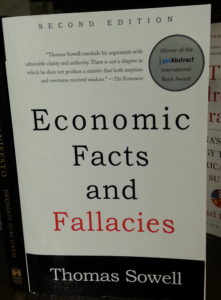 Ali further described how individuals including: Dr. Thomas Sowell, Jason Riley, John McWhorter, and Dr. Glen Loury – all great black thinkers and writers have been regarded as “Coons” because of their independent/conservative, and non-social justice ideas and views. Interestingly growing up on Buffalo’s eastside, I’d never heard about Dr. Sowell, the elder of the names mentioned. I was ironically introduced to one of Dr. Sowell’s books, “Inside American Education” by a Greek-American classmate at the University of Michigan one day when discussing politics as we ran our experiments. I didn’t hear anything about him either at Johnson C. Smith University, the HBCU I attended. Anyhow, in his podcast Ali further stated that within Black American social media circles, that it is not uncommon to be met with the term “Coon” for merely disagreeing with a person’s particular personal experience/position or the prevailing zeitgeist of the black community at large.
Ali further described how individuals including: Dr. Thomas Sowell, Jason Riley, John McWhorter, and Dr. Glen Loury – all great black thinkers and writers have been regarded as “Coons” because of their independent/conservative, and non-social justice ideas and views. Interestingly growing up on Buffalo’s eastside, I’d never heard about Dr. Sowell, the elder of the names mentioned. I was ironically introduced to one of Dr. Sowell’s books, “Inside American Education” by a Greek-American classmate at the University of Michigan one day when discussing politics as we ran our experiments. I didn’t hear anything about him either at Johnson C. Smith University, the HBCU I attended. Anyhow, in his podcast Ali further stated that within Black American social media circles, that it is not uncommon to be met with the term “Coon” for merely disagreeing with a person’s particular personal experience/position or the prevailing zeitgeist of the black community at large.
Taking Ownership Of Racial Insults And Slurs
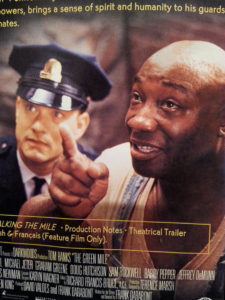 “Hey!!! What about me? Don’t you hold out on me you big Dummy-Nigger!!! Ha, ha, ha, ha…….”
“Hey!!! What about me? Don’t you hold out on me you big Dummy-Nigger!!! Ha, ha, ha, ha…….”
“Wild Bill” Wharton’s racial slur against John Coffey over not getting any cornbread in The Green Mile features another once humiliating word Black America has taken in as its own. Just like “Nigger”, “Coon” was also a racial slur used against blacks by whites in the Jim Crow era. Actually the Coon was a bigoted caricature of black people with the defining character trait of laziness. I tend to think of it when I think of the old “Minstrel Shows” where in some instances white people would dress up as black people (“Black Face”) and act like clowns and buffoons. In some instances, real black people participated.
In the 1990s, Hip Hop artists like Tupac Shakur took “Nigger” and transformed it into “Nigga” (Never-Ignorant-Getting-Goals-Accomplished), glorifying and popularizing the term, setting off countless debates both within and outside of the black community about who could use it, and if it should be used at all. Recently Bill Maher re-sparked the debate culminating in Ice Cube stating, “It’s our word now,” on Maher’s show. Then as now, some black people found it offensive and demeaning, while others felt as though a negative had been turned into a positive.
Some blacks felt and feel that it’s an accurate descriptor for the worst behaviors of our race – something echoed by many of our most popular comedians. Overall black people couldn’t and can’t seem to agree on it even today. Actually most black people do agree that it’s very offensive when other cultures use it with the exception of maybe Dominicans and Puerto Ricans due to some similarities in lineage and culture.
My First Time Hearing About Cooning
“You’re a COON!!!” I may have been out of the loop, as per usual, but I first heard the modern contexts for “Coon” and “Cooning” when watching one of Tommy Sotomayor’s YouTube videos. He’s one of the many black male YouTubers that I watch. I won’t go into too much detail about Tommy, and I may lose some readers here, but yes I have become a regular viewer and a fan. I don’t know that I would start a show saying the things he says, and in the ways that he says them, but personally coming from my background, he and others like him help explain a lot of things – particularly some of the pathologies in black communities across our country.
In most cases he holds our people responsible for their destructive behaviors and doesn’t blame white people, or dwell in the past. He focuses on what not to do. Tommy does lean conservative and he’s particularly hard on black women – I’m sorry, some black women. Those who regularly watch the show understand the “not all” distinction. He draws more than his fair share of backlash and death threats, and regularly gets accused of “Cooning”.
 “Coon Train is coming. Coon Train is coming. Coon Train is coming…”
“Coon Train is coming. Coon Train is coming. Coon Train is coming…”
Tommy’s arch-nemesis, a “Pro-Black” gentleman named Tariq Nasheed, created the “Coon Train Awards” similar to the “Soul Train Awards”. Someone created a jingle with the above words and a montage including Tommy Sotomayor and Jesse Peterson among others. The song is actually funny, and it sometimes pops into my mind. The actual use of the word does make me bristle though, especially when the person called the name is only asking a question, or is thinking differently than the person assigning it.
What is this modern day definition of a Coon? It’s usually angrily and viciously unleashed upon blacks perceived as having ‘white’ points of view in the eyes of ‘woke’ black people. It’s the modern day incarnation of an ‘Uncle Tom’, or ‘Oreo’, or ‘House Nigga’, or the character ‘Uncle Ruckus’ from The Boondocks who usually comes up when someone has been called Coon. It’s someone who is thought to be betraying the race for ‘White Supremacy’. One of the biggest contradictions is that it’s often used by those who would consider themselves pro-black (some of whom themselves indulge in colorism and bigotry against other brown skinned people). Consequently, both Coon and Nigga are terms designating one’s blackness, but in different ways – Nigga having good and bad contexts.
Cooning And Groupthink
 Calling someone Coon makes me think about the concept of ‘Groupthink’. A simple search of the term Groupthink on Google brings up the following definition:
Calling someone Coon makes me think about the concept of ‘Groupthink’. A simple search of the term Groupthink on Google brings up the following definition:
“Groupthink is a psychological phenomenon within a group of people in which the desire for harmony and conformity in the group results in an irrational or dysfunctional decision-making outcome. Group members try to minimize conflict and reach a consensus decision without critical evaluation of alternative viewpoints by actively suppressing dissenting viewpoints, and by isolating themselves from outside influences.”
Groupthink is very dangerous and organized religion gets a bad rap from instances where groups of people have been mobilized to do evil deeds in a suicidal fashion (Jonestown), or against non-believers. It’s simply following the herd without thinking. It’s voting a certain way because one’s parents or race traditionally voted or believed a certain way. It’s immediately calling someone a racist, a misogynist, or a sexist without analyzing all of the facts – usually responding off of pure emotion. Groupthink prevents its believers from acknowledging when the other person/side might have good ideas or valid points, strictly because they’re on the other side. These are all things I hear when someone calls someone else a Coon.
Interestingly, use of the word Coon seems to be an artifact of my generation and those behind us. When describing this to my mother’s generation (Boomers) who lived through the Civil Rights Era, and who readily heard this word and others in their youths, many are surprised and disapprove – at least those I’ve talked with. Some elders in general ironically loosely still use the word “Nigga” – sometimes in jest amongst themselves. Perhaps it’s just in our nature to turn negatives into positives, and adopt words that were once used against us.
How Do You Know If You’re Cooning?
 Are you Cooning? How do you know if you are? What warrants being called a Coon? Again, it often involves being black and having independent thoughts and conservative values. It could be a matter of criticizing Colin Kaepernick’s protest as Minister Jap and Oshay Duke Jackson did – both black men who were subsequently called “Coons” and in some instances “Klansmen” by some of their commenters – the majority black.
Are you Cooning? How do you know if you are? What warrants being called a Coon? Again, it often involves being black and having independent thoughts and conservative values. It could be a matter of criticizing Colin Kaepernick’s protest as Minister Jap and Oshay Duke Jackson did – both black men who were subsequently called “Coons” and in some instances “Klansmen” by some of their commenters – the majority black.
It could be something like saying the single-motherhood rate in the black community is too high and is the major impediment of the black race’s advancement in the United States. It could be pointing out that black people can be just as much, if not more, bigoted than white people – not racist of course, because black people don’t have power. It could be the belief that black people are accountable for their actions and that everything happening in 2017 isn’t the fault of white people. It could be stating that you weren’t offended by the Confederate flags and statues. Lastly, it could be citing and believing statistics arguing that there is an unusually high rate of black on black crime. Cooning could be any of these things and much more.
 “You’re a COON!!!” Whenever the word is unleashed on someone there is a definite viciousness to it. The individuals who use it always seem to be angry and have reached a level of frustration with the person they’ve ascribed it to, for not agreeing with their point of view. To see such a display, look up Roland Martin’s show where he hosted the “Prince of Pan-Africanism”, Dr. Umar Johnson. In a panel discussion about the state of Black America, Dr. Johnson readily unleashed the word on some of the other panelists all of whom were black. Martin, who aligns with the Democratic party, bristled at the use of the word, and constantly reminded Dr. Johnson not use it any further. The entire exchange was amusing, but at times shocking to watch.
“You’re a COON!!!” Whenever the word is unleashed on someone there is a definite viciousness to it. The individuals who use it always seem to be angry and have reached a level of frustration with the person they’ve ascribed it to, for not agreeing with their point of view. To see such a display, look up Roland Martin’s show where he hosted the “Prince of Pan-Africanism”, Dr. Umar Johnson. In a panel discussion about the state of Black America, Dr. Johnson readily unleashed the word on some of the other panelists all of whom were black. Martin, who aligns with the Democratic party, bristled at the use of the word, and constantly reminded Dr. Johnson not use it any further. The entire exchange was amusing, but at times shocking to watch.
Have I ever been called a Coon? Yes, I have on Twitter, but it was by someone no one takes seriously. Considering myself an independent – one who doesn’t belong to either political party, and who questions things, I’ll probably be called it to my face before long, but that’s okay. The important thing for me is to think critically and objectively – not solely off of emotion if I can help it, and not necessarily following the herd for the sake of following the herd. So if that makes me a Coon, then so be it.
Conclusions On Cooning
I’ll close by going back to our 45th President. As I told a cousin who insisted he was a racist over a fiery Thanksgiving dinner discussion prior to the 2016 election, I’ve never heard Donald J. Trump say “Coon” or “Nigga”, but I’ve certainly heard black people say them to other black people quite often. It’s kind of contradictory right? It’s like ‘Pro-Blacks’ mocking other blacks because they’re too dark. I guess it’s okay as long as we’re doing these things to one another.
 “You’re a COON!!!” Do I expect the people who enjoy using the word to stop? Of course not. While I stated above that the word is often used out of anger, those using it also seem to get a certain amount of enjoyment and satisfaction from using it. Interestingly, ‘Coon’ in its modern context offends me more than ‘Nigga’ does. So no, I don’t expect much of anything to change, but perhaps I’ve raised awareness here to some degree.
“You’re a COON!!!” Do I expect the people who enjoy using the word to stop? Of course not. While I stated above that the word is often used out of anger, those using it also seem to get a certain amount of enjoyment and satisfaction from using it. Interestingly, ‘Coon’ in its modern context offends me more than ‘Nigga’ does. So no, I don’t expect much of anything to change, but perhaps I’ve raised awareness here to some degree.
A cousin donated the meme at the beginning of this post in a Facebook thread I was tagged in, started by another cousin who really, really wants President Trump impeached. I used pictures of Dr. Ben Carson and Sheriff David Clarke, Jr. in this post because their books just happened to be in stock at my local Barnes & Noble recently. The same is true for Dr. Michael Eric Dyson, though I couldn’t find a good picture of Dr. Thomas Sowell. The newspaper photos were courtesy of the Washington Post’s daily morning express edition handed out during my morning commute.
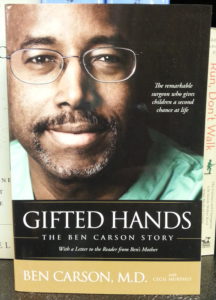 Both Carson and Clarke are well known for different reasons, and both are considered Coons. Sheriff Clarke is unashamedly conservative and strongly believes in law and order. I saw Dr. Carson speak live during graduate school for Dr. Martin Luther King, Jr.’s birthday when he still had his legendary status.
Both Carson and Clarke are well known for different reasons, and both are considered Coons. Sheriff Clarke is unashamedly conservative and strongly believes in law and order. I saw Dr. Carson speak live during graduate school for Dr. Martin Luther King, Jr.’s birthday when he still had his legendary status.
He’s intriguing not only because he’s also a Michigan alumnus, but because this brilliant and gifted neurosurgeon has fallen from grace in parts of the black community due to his conservative politics, traditional values, and his working in the Trump administration. In the eyes of many, his medical and scientific accomplishments are now forever tainted. Lastly, while I’ve discussed only men in this piece, there are black women who draw similar criticisms – Deneen Borelli, and Stacy Dash come to mind.
I want to thank my brother and a group of friends for being my test audience for this potentially volatile topic. We collectively discuss these issues all week long. I especially want to acknowledge the Gaines brothers for turning me onto Tommy Sotomayor, Obsidian Radio, and the other black male YouTubers. Without the discussions on their channels and podcasts, I wouldn’t have known most of this stuff was going on, and I wouldn’t have had the perspective to craft this post.
Thank you for taking the time out to read this blog post. If you enjoyed this post, you might also enjoy:
• What are your plans for your tax cut? Thoughts on what can be done with heavier paychecks and paying less tax
• The benefits and challenges of using articulate speech
• Challenging misconceptions and stereotypes in academic achievement
• Challenging misconceptions and stereotypes in class, household income, wealth and privilege
• Who will benefits from Apple’s $350 billion investment?
If you’ve found value here and think it would benefit others, please share it and/or leave a comment. I’ve started a YouTube channel which is entitled, Big Discussions76. To receive all of the most up to date content from the Big Words Blog Site, subscribe using the subscription box in the right hand column in this post and throughout the site, or add the link to my RSS feed to your feedreader. Lastly, follow me on Twitter at @BWArePowerful, on Instagram at @anwaryusef76, and at the Big Words Blog Site Facebook page. While my main areas of focus are Education, STEM and Financial Literacy, there are other blogs/sites I endorse which can be found on that particular page of my site.

 One of the
One of the  According to Investopedia, “
According to Investopedia, “ I’ll close by going back to
I’ll close by going back to 
 Put simply
Put simply  In Black America, points of view varied as they normally do with all things political and socioeconomic. The Pro-Black Activists and the “
In Black America, points of view varied as they normally do with all things political and socioeconomic. The Pro-Black Activists and the “ One of the talk show hosts stated that at some point reality will crash down hard on
One of the talk show hosts stated that at some point reality will crash down hard on  One of the focuses of the Big Words Blog Site is Education – all aspects. Higher education is not just a means to a career and upward mobility, but it’s also a business with both benefits and costs to the student, parents, the institution, and society. Likewise, one of the major concerns of parents and students, in addition to getting into a school, is actually financing the college tuition, room and board. The amount of money awarded students was, in fact, one of the major discussion points recently at the
One of the focuses of the Big Words Blog Site is Education – all aspects. Higher education is not just a means to a career and upward mobility, but it’s also a business with both benefits and costs to the student, parents, the institution, and society. Likewise, one of the major concerns of parents and students, in addition to getting into a school, is actually financing the college tuition, room and board. The amount of money awarded students was, in fact, one of the major discussion points recently at the 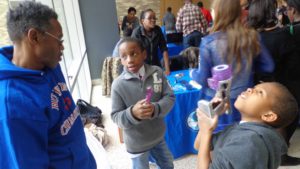 This is the continuation of my Black History Month interview with Dr. Vernon Morris of Howard University’s Department of Chemistry and
This is the continuation of my Black History Month interview with Dr. Vernon Morris of Howard University’s Department of Chemistry and 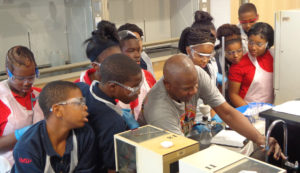 Vernon Morris: We started in 2009 and part of our motivation is that we were seeing fewer and fewer students from Washington, DC who were coming to chemistry, or even coming to
Vernon Morris: We started in 2009 and part of our motivation is that we were seeing fewer and fewer students from Washington, DC who were coming to chemistry, or even coming to  VM: Yes, the kids really enjoy it in addition to the
VM: Yes, the kids really enjoy it in addition to the 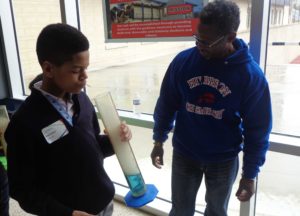 VM: I don’t think it’s cultural. I think it’s socioeconomic. I think you’d find a similar thing across all cultures if the economic stresses are great enough. If the economic stresses are lower, parents have more time to go to the family science fairs or
VM: I don’t think it’s cultural. I think it’s socioeconomic. I think you’d find a similar thing across all cultures if the economic stresses are great enough. If the economic stresses are lower, parents have more time to go to the family science fairs or 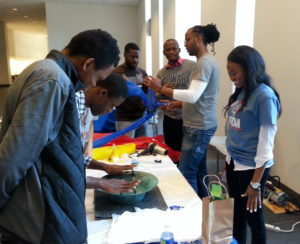 There is a separate body that governs what goes into the schools. The politics of the DC schools,
There is a separate body that governs what goes into the schools. The politics of the DC schools, 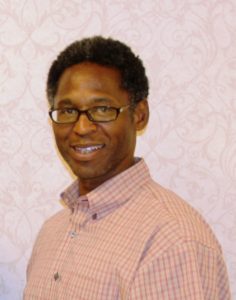 VM: I would say this about a science career in general, it’s a very rewarding career. I really enjoy what I do and I love coming to work every day. It’s part exploration, mentoring and teaching, and writing and being creative. It’s being quantitative and using both sides of your brain. And you can give back to the community and the nation in a very unique way. And I think there are so many opportunities in science. People think, “I don’t want to do chemistry and I don’t want to sit in a lab and mix chemicals”, but there’s a whole world of stuff outside of the lab that you can do. It’s the same thing for physics or mathematics, or biology. It’s an area that if you study it, the world is open to you.
VM: I would say this about a science career in general, it’s a very rewarding career. I really enjoy what I do and I love coming to work every day. It’s part exploration, mentoring and teaching, and writing and being creative. It’s being quantitative and using both sides of your brain. And you can give back to the community and the nation in a very unique way. And I think there are so many opportunities in science. People think, “I don’t want to do chemistry and I don’t want to sit in a lab and mix chemicals”, but there’s a whole world of stuff outside of the lab that you can do. It’s the same thing for physics or mathematics, or biology. It’s an area that if you study it, the world is open to you.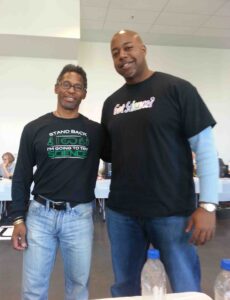 VM: Okay, that would great. We’d love to have you come out and help out Anwar.
VM: Okay, that would great. We’d love to have you come out and help out Anwar. VM: No, I actually was not exposed at all. I never had the chance to do science fairs or any of that stuff. I think my first exposure to anyone who was in science was actually one of my mother’s friends, Carolyn Clay, who was an engineer from
VM: No, I actually was not exposed at all. I never had the chance to do science fairs or any of that stuff. I think my first exposure to anyone who was in science was actually one of my mother’s friends, Carolyn Clay, who was an engineer from 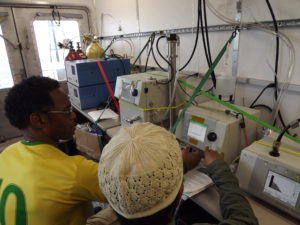 VM: From
VM: From  VM: We’re working on a lot of stuff, but the work revolves around trying to get a better quantitative understanding of how atmospheric particulates influence the chemistry of the atmosphere and climate across multiple scales. These are multiple spatio-temporal scales. There are time scales because the lifetime of aerosols tends to be days to months, but their influence in the atmosphere tends to range from that time scale to much longer time scales as clouds change their optical properties; that influences radiative balance and seasonal fluctuations. If you look at particle evolution, once an aerosol is formed and injected into the atmosphere from the ground layer, how does it influence and have these multiplying effects across larger spatial fields as it moves around the atmosphere, and through larger temporal scales as it effects something that has a multiple “follow on” effect?
VM: We’re working on a lot of stuff, but the work revolves around trying to get a better quantitative understanding of how atmospheric particulates influence the chemistry of the atmosphere and climate across multiple scales. These are multiple spatio-temporal scales. There are time scales because the lifetime of aerosols tends to be days to months, but their influence in the atmosphere tends to range from that time scale to much longer time scales as clouds change their optical properties; that influences radiative balance and seasonal fluctuations. If you look at particle evolution, once an aerosol is formed and injected into the atmosphere from the ground layer, how does it influence and have these multiplying effects across larger spatial fields as it moves around the atmosphere, and through larger temporal scales as it effects something that has a multiple “follow on” effect? The ship experimental cruises allow us to look at the transport of aerosols that are transmitted from Africa either from the Sahara Desert or as a result of burning biomass from “Slash and Burn” agriculture. Particles get into the atmosphere and influence tropical cyclone development, and they influence acidification of the upper ocean. They also influence microbiological transfer, the transfer of microbes across hemispheres. They influence cloud properties and precipitation properties downstream and food security. So they have all of these implications that are much longer and much larger than a particular fire, or a particular dust storm. You have to connect that with field observations, laboratory studies and with space-based observations as well.
The ship experimental cruises allow us to look at the transport of aerosols that are transmitted from Africa either from the Sahara Desert or as a result of burning biomass from “Slash and Burn” agriculture. Particles get into the atmosphere and influence tropical cyclone development, and they influence acidification of the upper ocean. They also influence microbiological transfer, the transfer of microbes across hemispheres. They influence cloud properties and precipitation properties downstream and food security. So they have all of these implications that are much longer and much larger than a particular fire, or a particular dust storm. You have to connect that with field observations, laboratory studies and with space-based observations as well. AD: You know, Vernon, as you were talking just now, I was just reflecting on how important it is to know these things. A couple of years ago a mentor who himself isn’t a scientist, but who saw that I was trying to develop my own writing and mentoring voice, gave me a copy of “
AD: You know, Vernon, as you were talking just now, I was just reflecting on how important it is to know these things. A couple of years ago a mentor who himself isn’t a scientist, but who saw that I was trying to develop my own writing and mentoring voice, gave me a copy of “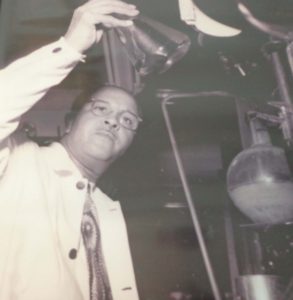
 I recently co-wrote movie reviews with my brother Amahl Dunbar for
I recently co-wrote movie reviews with my brother Amahl Dunbar for 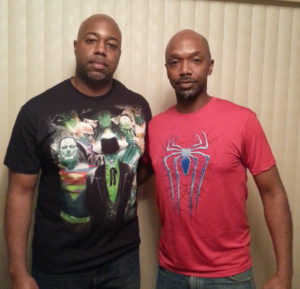 Our Twitter handles are
Our Twitter handles are 
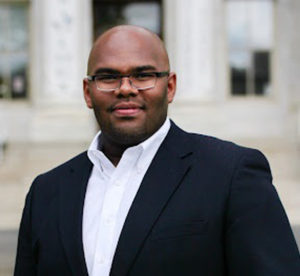 Late in 2015, I was approached with an opportunity to conduct an interview with
Late in 2015, I was approached with an opportunity to conduct an interview with  JM: Well, just one other piece about the financial component. On our Honor Your Future Now website, we talk about what students need to think about in terms of being a leader in their school and a successful student. But as we think about this time of year, the conversation in schools across the country is how do you prepare to enroll in college, so we provide timelines for the various academic years and, as we think about college, we offer information in three ways. We ask students and families to think about their own resources first. Second, we’re encouraging them to get financial aid by completing the
JM: Well, just one other piece about the financial component. On our Honor Your Future Now website, we talk about what students need to think about in terms of being a leader in their school and a successful student. But as we think about this time of year, the conversation in schools across the country is how do you prepare to enroll in college, so we provide timelines for the various academic years and, as we think about college, we offer information in three ways. We ask students and families to think about their own resources first. Second, we’re encouraging them to get financial aid by completing the 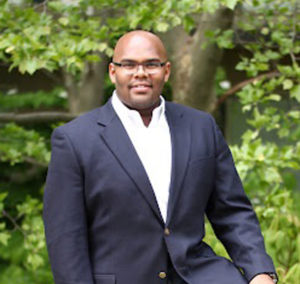 JM: You know, to make a long story short, I always used to play school as kid so I’ve always loved what school looked like. Professionally, I began my career working in college admissions, and then I served in a post-secondary institution, and then in a secondary school. I served as the director of college counseling for a charter school, and I also served as an admissions counselor and a multicultural recruiter. I spent a lot of time doing induction programs for new students. I completed a Ph.D. in Urban Education Policy with a focus on this conversation we’re having around access and success for students, so my career has been and will continue to be around getting students to and through college. It’s what I’m most passionate about, and you know, playing school as a kid and growing up on colleges campuses, I know few other places as well as I know colleges and high schools, so it’s truly a pleasure to serve in this capacity. But it’s been my career and it will continue to be; helping students actualize their dreams.
JM: You know, to make a long story short, I always used to play school as kid so I’ve always loved what school looked like. Professionally, I began my career working in college admissions, and then I served in a post-secondary institution, and then in a secondary school. I served as the director of college counseling for a charter school, and I also served as an admissions counselor and a multicultural recruiter. I spent a lot of time doing induction programs for new students. I completed a Ph.D. in Urban Education Policy with a focus on this conversation we’re having around access and success for students, so my career has been and will continue to be around getting students to and through college. It’s what I’m most passionate about, and you know, playing school as a kid and growing up on colleges campuses, I know few other places as well as I know colleges and high schools, so it’s truly a pleasure to serve in this capacity. But it’s been my career and it will continue to be; helping students actualize their dreams.